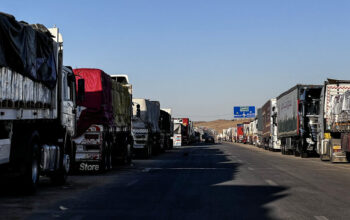
Global hunger and the chronic inability to access food skyrocketed in 2021, with 2.3 billion people facing moderate or severe food insecurity around the world, the United Nations said in a report released Wednesday.
“The world is moving backward in its efforts to end hunger, food insecurity and malnutrition in all its forms,” the report said, in part as a result of the war in Ukraine, which is disrupting supply chains and contributing to the rising prices in energy, grain and fertilizers.
Ronald Tran Ba Huy, World Food Program’s deputy director for research assessment, said in a news briefing on Wednesday that prior to the pandemic, 135 million people faced acute food insecurity; before Russia’s invasion of Ukraine, that figure reached 276 million people. The estimated figure for 2022, he said, was 335 million people across 82 countries.
David Beasley, the World Food Program executive director, said at an event for the report’s release that the food crisis caused by the war in Ukraine would push countries into famine, resulting in “global destabilization, starvation and mass migration on an unprecedented scale.”
Russia and Ukraine produce about a third of the world’s supply of wheat and barley, and more than 50 percent of the global supply of sunflower oil. Russia is also a top exporter of fertilizers, oil and gas. The United Nations estimates that about 25 million metric tons of Ukrainian grain are currently trapped in silos because of Russian blockades of seaports in the Black Sea and attacks on railways in Ukraine.
The organization has been trying to broker a “double package” deal that would allow Ukrainian grain to be shipped out to market in exchange for facilitating Russia’s sales of fertilizer.
World leaders have discussed moving the grain by rail from Ukraine to neighboring countries, like Romania and Belarus, and then on to ships in their Black Sea ports, a time-consuming and logistically complicated process. In particular, securing the cooperation of Belarus, a strong ally of Russia, would be difficult.
So far no agreement has materialized.
But the chief economist of the United Nation’s Food and Agriculture Organization, Maximo Torero, told reporters on Wednesday that even if all of Ukraine’s grain was freed immediately, getting it to global markets would not resolve the crisis. Instead, he said, introducing the grains into the market could lead to sudden prices drops that would negatively affect farmers, who have to buy expensive fertilizers.
Mr. Torero said a better plan would be to carefully plan and create an emergency reserve.
The U.N. report, which was prepared by five U.N. agencies, recommended that governments overhaul agricultural policies and reallocate the $630 million that is collectively spent every year on food and agriculture to reduce the cost of nutritious food and make healthy diets more affordable and available.



